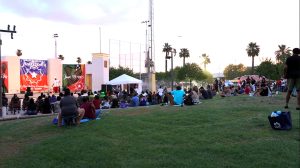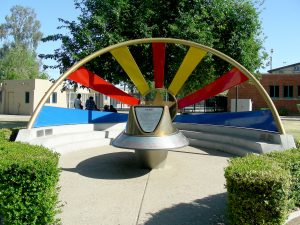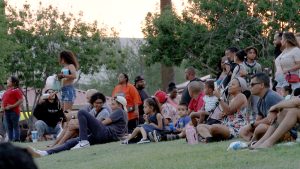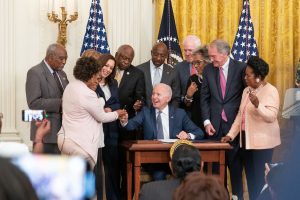- Slug: BC-CNS Phoenix Eastlake Juneteenth, 770 words.
- 4 photos and captions below.
By Taylor Corlew
Cronkite News
PHOENIX – Certain landmarks symbolize more than simply the region in which they’re located. Some, like historic Eastlake Park, are rooted in the sense of community, culture and history.
The Eastlake Park Community Center threw its annual Juneteenth celebration Saturday, a tradition since the early 1920s. Eastlake Park has been a haven for the Black community in Phoenix for quite some time, playing a central role in the community during many social movements in Arizona.
The event included vendors and food trucks, live entertainment and multiple speakers who touched on the significance of the Juneteenth holiday. The atmosphere was festive, with the event-goers fervently celebrating community and culture.
“Eastlake Park is so important to the civil rights history of Arizona,” Phoenix Mayor Kate Gallego said at the event. “So many of the important organizing efforts began right here. That’s part of the reason that we chose this park for the city’s civil rights memorial. We want to keep celebrating that Eastlake Park and the community around it has been a source of justice in Phoenix.”
How Juneteenth has evolved
Juneteenth refers to June 19, 1865, the day when federal troops arrived in Galveston, Texas, to ensure that all remaining enslaved people were freed from bondage. The troops’ arrival came more than two years after President Abraham Lincoln signed the Emancipation Proclamation, freeing enslaved people in Confederate states.
In 2016, Arizona became the 45th state to recognize Juneteenth as an unofficial holiday. Tempe, Goodyear, Avondale, Scottsdale, Tolleson and Surprise also recognize Juneteenth as a paid holiday for city employees, according to Axios.
Phoenix’s first Juneteenth celebration took place in 1911, following a visit by Booker T. Washington at the Great Emancipation Jubilee, according to the Arizona Women’s Hall of Fame; however, the first Juneteenth event at Eastlake Park didn’t occur until 1921.
Over the years, the Juneteenth celebrations became less centralized, until Vernell Coleman, a community organizer, helped restore the tradition in the Phoenix area in the 1960s.
While many Black Americans across the country have informally celebrated this day for generations, last year, President Joe Biden signed a bill that officially made Juneteenth a federal holiday.
“The city of Phoenix and Eastlake Park has a long tradition of observing Juneteenth,” Gallego said. “It’s an opportunity for our community to come together, remember our history and embrace the Juneteenth vision of equality and opportunity for all.”
Eastlake Park’s historical significance
Originally known as Patton’s Park and later Phoenix Park, Eastlake Park is bounded by Washington and Jefferson streets, and 12th and 16th streets. Developed in 1889 to help promote a new subdivision east of downtown, it included a “swimming bath” and other amenities to provide a cool spot that was easily accessible by a newly extended streetcar line. By the turn of the 20th century, the park had evolved into a safe space for people of color to relax, play, hold neighborhood meetings and, most importantly, find community
Racism also was a factor in Eastlake Park becoming so tightly knit. Through informal policies and property restrictions, Black people were forbidden to purchase any residential property north of Van Buren Street. That communal neighborhood atmosphere still remains today.
The churches, businesses and community centers around Eastlake Park have always made a concerted effort to foster an inclusive community for not only Black people but for minorities in general.
Many civil rights activists have appeared at Eastlake Park, from W.E.B. Du Bois to Martin Luther King Jr.
“No place in Arizona has the social impact quite like Eastlake does,” Jackie Berry, owner of Berry Realty & Associates. “This is the foundation in which many Black professionals here in Phoenix have been rooted.”
Calvin C. Goode, who was on the City Council for 22 years, lived in Eastlake Park, and Cloves Campbell Sr. co-founded the Arizona Informant there, Berry said. The Informant, the only Black-owned newspaper in Arizona, co-sponsored the Juneteenth event.
Gershom Williams, historian and spokesperson for the Juneteenth event, touched on the importance of tradition and how the day didn’t need to be recognized by the government to authenticate it.
“If you haven’t noticed, more celebrations are happening today and tomorrow than ever before,” Williams said. “I hope this continues, but we’ve been consistent with it here. We didn’t wait for it to become legitimized by the city and the government.”
The history, tradition and culture inextricable with Eastlake Park have endured. And although this year’s Juneteenth party is over, organizers can take pride in the evolution of the holiday from a celebration in the Black community to a federally recognized day of remembrance.
For more stories from Cronkite News, visit cronkitenews.azpbs.org.
^__=



